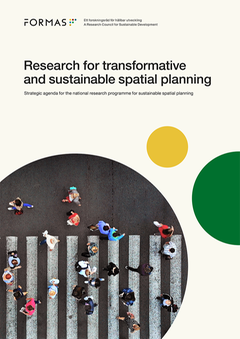Research for transformative and sustainable spatial planning
In this strategic agenda, we present the objectives, thematic orientations and work approaches of the national research programme for sustainable spatial planning.
This is a revised version of the original agenda, which was published in 2018 when the programme was created. The revision has been made in light of the lessons learned during the first years of the programme and the additional funding provided by the government starting in 2021. The revision was carried out in 2021.
Read the summary below or download the full report.
Published: 4 May 2022
Report: R8:2021
ISBN: 978-91-540-6142-6
Language: English
Summary

Strategic agenda for the national research programme for sustainable spatial planning
The national research programme for sustainable spatial planning funds research and innovation that can contribute to a transformative, sustainable planning and built environment. The research programme stems from a government commission received by Formas and spans the period 2017–2026. The research programme for sustainable spatial planning is one of 13 national research programmes established to enable society to address key complex challenges.
Planning and building more sustainably societies require several structural shifts that will compel us to change our socio-technical and socio-ecological systems. Such shifts represent a transformation that encompasses technological innovation, changes in behaviour, culture and norms, and changes in our governing institutions. Working towards this transformation requires continuous, integrated processes for innovation, knowledge building and reflection. The task of the national research programme for sustainable spatial planning is to support a sustainable transformation by ensuring that new research and innovation are funded and that the knowledge generated can be translated into action.
The research programme aims to contribute to policy objectives, but another crucial task is to critically review, complement and think beyond today’s policy objectives. The research programme thus covers a wide range of research approaches and initiatives.
In this strategic agenda, we present the objectives, thematic orientations and work approaches of the national research programme for sustainable spatial planning. This is a revised version of the original agenda, which was published in 2018 when the programme was created. The revision has been made in light of the lessons learned during the first years of the programme and the additional funding provided by the government starting in 2021. The revision was carried out in 2021.
The research programme and research agenda provide a platform for research and innovation, and create synergies between stakeholders that complement each other in terms of knowledge, expertise and projects. Therefore, a programme committee and a working group provide support for working on the programme. These groups are comprised of public research funders that are relevant for the area. The programme committee is headed by an external chair. This agenda shows the roles and specialisations of the various stakeholders. Thanks to our joint efforts on revising the research agenda, it can serve as a starting point for dialogue and coordination of future initiatives among the research funders.
In the agenda, we identify a number of key themes and perspectives that must be prioritised. More knowledge and new solutions are needed in these areas so that society can shift to transformative, sustainable spatial planning.
We have identified the following themes:
- Sustainable residential and public environments focuses on sustainably designed and inclusive physical environments and a housing supply for everyone.
- Sustainable mobility systems for all focuses on integrated and coordinated transport planning, increased sustainable travel and transport, and sustainable mobility practices.
- Human health and well-being focuses on living environments that have a positive impact on public health and to reduce environmental pollution in buildings, air, soil and water.
- Security and safety for people and societies focuses on access to safe and secure public spaces, the safety and robustness of vital public functions, and reduced risks in the built environment.
- Sustainable consumption and production focuses on living environments for reduced and sustainable consumption as well as a lower carbon footprint and emissions in construction and building management.
- Sustainable land and water use focuses on spatial planning where long-term land use and land and water use are adapted to future climate change.
As a complement to these themes, we have identified five perspectives that intersect the themes:
- Governance, policy and economics addresses the need for transformative governance approaches, policy development and sustainable socio-economic models.
- Organisation, collaboration and leadership addresses on the complexity and variety of stakeholders involved in spatial planning and the need to coordinate processes in order to enable comprehensive solutions.
- Accessibility, equity and gender equality addresses the importance of considering the perspective of end users as well as their different needs and abilities early on in the planning process. This will help to achieve a holistic view of spatial planning and to include social issues to a greater extent.
- Democracy and participation addresses that openness, fairness, participation and transparency should form the essence of a well-functioning spatial planning process.
- Digitalisation and artificial intelligence addresses today’s
opportunities and challenges concerning new technology solutions for more interactive, integrated and sustainable planning and management.
The different themes and perspectives intersect and should not be treated as silos. They relate to all planning levels in society, and take as their starting point historical experiences, modern-day conditions and challenges, and future impacts and opportunities. The need for more knowledge and new solutions within each perspective affects all themes. In the research programme, we therefore support research and innovation that combines multiple themes and perspectives.

